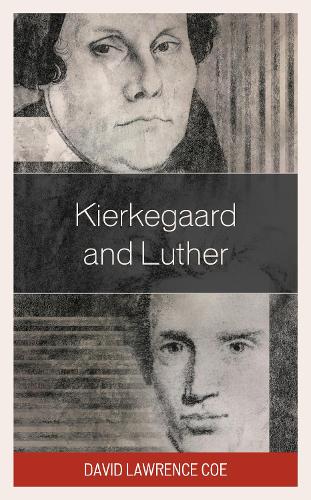
Kierkegaard and Luther
(Hardback)
Available Formats
Publishing Details
Kierkegaard and Luther
By (Author) David Lawrence Coe
Bloomsbury Publishing PLC
Lexington Books/Fortress Academic
9th July 2020
United States
Classifications
Professional and Scholarly
Non Fiction
History of religion
Philosophy
230.0440922
Winner of Outstanding Academic Title 2021
Physical Properties
Hardback
274
Width 160mm, Height 228mm, Spine 26mm
590g
Description
Sren Kierkegaard denounced nineteenth-century Danish Lutheranism for exploiting Martin Luther's doctrine of justification "without works" as justification for an antinomian easy life. Kierkegaard saw his own writing as a corrective: I have wanted to prevent people in Christendom from existentially taking in vain Luther and the significance of Luther's life. In 1847, Kierkegaard began an eight-year reading of Luthers sermons, forking through them for extracts to confirm his theological corrective rather than to comprehend the breadth of Luthers thought. While he found much to laud, Kierkegaard also found much to lance, privately commenting that Luther was partially responsible for what he considered the problematic Lutheranism of his own day. Furthermore, David Coe argues, Kierkegaard was unaware that his copy of Luther's church and house postils was a heavily abridged edition of extracts from those postils. Therefore, his appraisal of Luther begs to be investigated. Kierkegaard and Luther examines the Luther sermons Kierkegaard read, what he praised and criticized, missed, and misjudged of Luther, and spotlights the concord these two Lutheran giants actually shared, namely, the negative yet necessary role that Christian suffering (Anfechtung/Anfgtelse) plays in Christian faith and life.
Reviews
Martin Luther's influence on Sren Kierkegaard is undeniable, yet the specific details of that influence have been underdeveloped in the scholarly literature. Coe (theology and philosophy, Concordia Univ., Nebraska) aims to fill that gap by offering a careful reading of Kierkegaard's writings on Luther alongside a deep engagement with the Lutheran source texts Kierkegaard drew from and commented on. Coe's argument is sophisticated, and his scholarship is impeccable. The book is well researched and will likely stand as the most important resource on the Kierkegaard/Luther relationship in the coming decades. The volume is as much about Luther as it is about Kierkegaard. Specifically, Coe compellingly argues that Kierkegaard's understanding of Luther was marked by limitations that should motivate rethinking Kierkegaard's charge that Luther failed to incorporate dialectic into his theology in ways that would protect against the abuses of Danish Lutheranism so prominent in the 19th century. According to Coe, a more robust reading of Luther's texts allows an interpretation of his work that already incorporates the dialectical aspects for which Kierkegaard was looking. Simply put, this book is excellent. Summing Up: Essential. Upper-division undergraduates through faculty.
-- "Choice Reviews"Author Bio
David Lawrence Coe is assistant professor of theology and philosophy at Concordia University, Nebraska.
